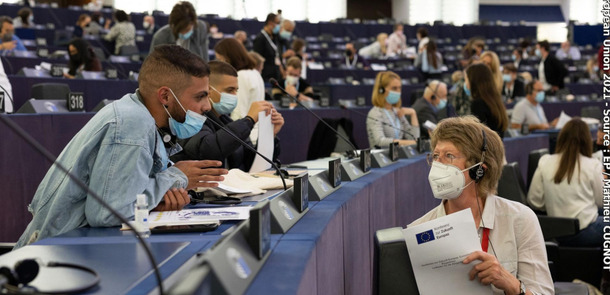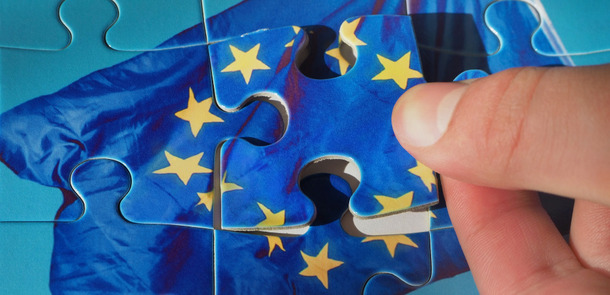All eyes will be on Donald Trump when he attends the international summits of NATO and the G7 at the end of May. On his first trip to Europe he is also set to meet the presidents of the European Council and the European Commission, Donald Tusk and Jean-Claude Juncker. Policymakers in Brussels and across European capitals will therefore listen very carefully to what the new U.S. president has to say about his commitment to European integration, transatlantic trade relations and the strength of the euro. A comment by Katharina Gnath.
Understanding European Integration
On the campaign trail Donald Trump reneged from the long-standing U.S. position of supporting the European Union as the basis of a stable, peaceful, and prosperous continent. He applauded the United Kingdom for deciding to leave the European Union and expected other countries to follow suit. Ted Malloch, who has been named as possible ambassador to the EU, is on record saying that the Union is "undemocratic and bloated", and he suggested that it might not be in the United States' interest to promote the European integration project in the future. He also contended that the common European currency was in fundamental crisis and predicted that the euro could collapse over the coming year.
More recently, and after several meetings with European leaders, including German chancellor Angela Merkel, President Trump has described the EU as "wonderful." He said he was "totally in favor of it" and praised the Union for sticking together after last year’s Brexit vote. Despite the rhetoric turnabout, one important question will be whether Trump will support European integration not only in word, but also in deed.
Negotiating Transatlantic Trade
A crucial test for Trump's commitment to the EU will be in the area of trade where EU countries have transferred exclusive competence to the European level and the European Commission. Trump and his team on several occasions have stated a clear preference for conducting future international relationships on a bilateral rather than a multilateral basis, with little appreciation for the EU's unique role in many policy areas. For example, the new administration announced that the United Kingdom would be the first in line for a trade deal with the United States, showing no understanding for the complex divorce negotiations that Brexit entails.
After announcing to revisit all pending international trade deals, the new U.S. Secretary of Commerce Wilbur Ross has recently opened the door to reviving transatlantic trade negotiations. It is still unclear whether President Trump will really pick up the negotiations again. If he does, however, the important question will be whether European leaders will stand firm and manage to convince the new U.S. administration that it is in everybody's best interest to interact with a unified EU.
Fighting the U.S. Trade Deficit
The most immediate—and difficult—question for European policymakers will be on trade imbalances and their link to the euro. In 2016, the euro zone accumulated a current account surplus of 3.4 percent of gross domestic product (GDP). This was lower than Germany’s in relative terms, which according to estimates by the International Monetary Fund hit a new high at around $300 billion last year (or 8.5 percent of GDP) and even exceeded that of much-maligned China, which amounted to around $245 billion or around 3 percent of GDP.
Donald Trump has repeatedly targeted the European (and particularly German) trade surplus and the euro which he referred to as a "vehicle for Germany". The criticism that the country uses the undervalued euro to gain an unfair trade advantage and to exploit its trading partners is also a recurring theme in the statements of Peter Navarro, head of the United States’ newly created National Trade Council.
There is a catch: In the European Monetary Union it is the independent European Central Bank that determines the common currency's value, and thus its exchange rate, not Germany. While there are options for individual euro countries to adjust their real exchange rate within the euro zone and vis-à-vis the rest of the world by way of higher internal investment and inflation, there is nothing in terms of straightforward monetary or trade policy that any single euro country can do to reduce the European trade surplus with the United States.
In recent weeks the new U.S. administration has adopted a more moderate tone on trade and currency policy, choosing not to label Germany as a currency manipulator in a highly anticipated report in mid-April. Yet while there is a good chance that the understanding among Trump’s team will grow with regard the EU's unique governance structure and the available policy levers of European countries, the United States has always been the most insistent among large economies that its current account deficits are the fault of other large economies that either deliberately run external surplus or refuse to correct them.
It therefore seems unlikely that President Trump will easily back away from the battle to reduce the U.S. trade deficit and the revision of allegedly unfair trade relations. After all, this has been one of his central campaign promises. In addition, the fact that Germany is benefiting from a weak euro cannot be dismissed easily. The common currency suffers from an underlying heterogeneity among its members, and the weakness of the southern European economies holds the euro at a lower exchange rate than the Deutschmark would have as a free-standing currency. The U.S. finger pointing to Europe’s current account surplus as a key source for the imbalance will most likely also stoke the underlying debate between Germany and other European member states and EU institutions as to who is to blame for the imbalances within the monetary union—and who is responsible to reduce them.
Looking for Vital Signs
At a time when the EU faces strong headwinds at home, with centrifugal and anti-European forces gaining ground in a number of member states, the future relations with its long-standing ally across the Atlantic will be of great importance. The early days of Donald Trump's presidency have been marked by political noise and policy reversals. Those who are looking for definite answers from Donald Trump on his upcoming visit to Europe will therefore likely be disappointed. Nonetheless, as the new administration is preparing for the president's international summits, vital first signs will help Europeans in deciphering the contours of future U.S.-EU relations.
![[Translate to English:] Flaggen USA/Europa](/fileadmin/files/mam_imported/2017-05/426500726panthermedia_A11119743_1240_.jpg)



